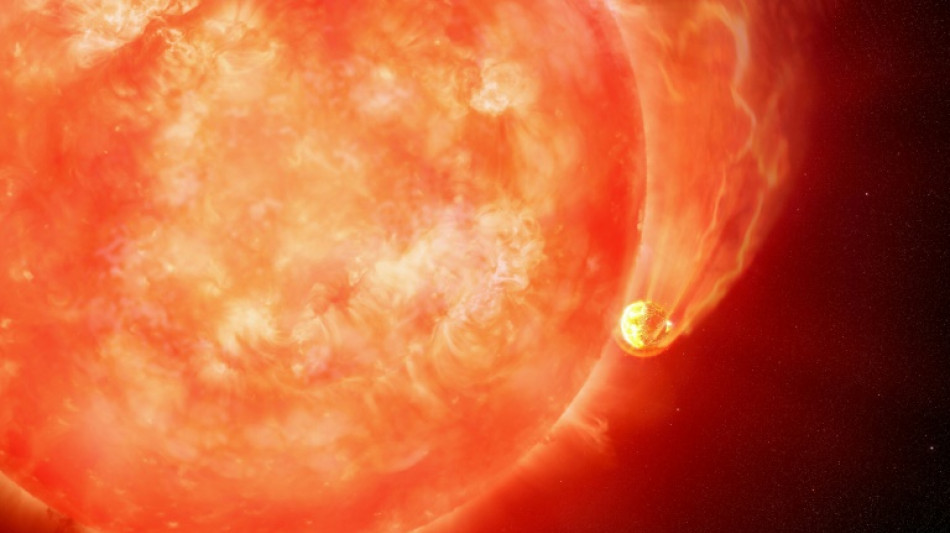
-
 Asian markets rally with Wall St as rate hopes rise, AI fears ease
Asian markets rally with Wall St as rate hopes rise, AI fears ease
-
Jailed Malaysian ex-PM Najib loses bid for house arrest

-
 Banned film exposes Hong Kong's censorship trend, director says
Banned film exposes Hong Kong's censorship trend, director says
-
Duffy, Patel force West Indies collapse as NZ close in on Test series win

-
 Australian state pushes tough gun laws, 'terror symbols' ban after shooting
Australian state pushes tough gun laws, 'terror symbols' ban after shooting
-
A night out on the town during Nigeria's 'Detty December'

-
 US in 'pursuit' of third oil tanker in Caribbean: official
US in 'pursuit' of third oil tanker in Caribbean: official
-
CO2 soon to be buried under North Sea oil platform

-
 Steelers edge Lions as Bears, 49ers reach playoffs
Steelers edge Lions as Bears, 49ers reach playoffs
-
India's Bollywood counts costs as star fees squeeze profits

-
 McCullum admits errors in Ashes preparations as England look to salvage pride
McCullum admits errors in Ashes preparations as England look to salvage pride
-
Pets, pedis and peppermints: When the diva is a donkey

-
 'A den of bandits': Rwanda closes thousands of evangelical churches
'A den of bandits': Rwanda closes thousands of evangelical churches
-
Southeast Asia bloc meets to press Thailand, Cambodia on truce

-
 As US battles China on AI, some companies choose Chinese
As US battles China on AI, some companies choose Chinese
-
AI resurrections of dead celebrities amuse and rankle

-
 Steelers receiver Metcalf strikes Lions fan
Steelers receiver Metcalf strikes Lions fan
-
Morocco coach 'taking no risks' with Hakimi fitness

-
 Gang members given hundreds-years-long sentences in El Salvador
Gang members given hundreds-years-long sentences in El Salvador
-
Chargers, Bills edge closer to playoff berths

-
 Gang members given hundred-years-long sentences in El Salvador
Gang members given hundred-years-long sentences in El Salvador
-
Hosts Morocco off to winning start at Africa Cup of Nations

-
 No jacket required for Emery as Villa dream of title glory
No jacket required for Emery as Villa dream of title glory
-
Amorim fears United captain Fernandes will be out 'a while'

-
 Nigerian government frees 130 kidnapped Catholic schoolchildren
Nigerian government frees 130 kidnapped Catholic schoolchildren
-
Captain Kane helps undermanned Bayern go nine clear in Bundesliga

-
 Captain Kane helps undermanned Bayern go nine clear
Captain Kane helps undermanned Bayern go nine clear
-
Rogers stars as Villa beat Man Utd to boost title bid

-
 Barca strengthen Liga lead at Villarreal, Atletico go third
Barca strengthen Liga lead at Villarreal, Atletico go third
-
Third 'Avatar' film soars to top in N. American box office debut

-
 Third day of Ukraine settlement talks to begin in Miami
Third day of Ukraine settlement talks to begin in Miami
-
Barcelona's Raphinha, Yamal strike in Villarreal win

-
 Macron, on UAE visit, announces new French aircraft carrier
Macron, on UAE visit, announces new French aircraft carrier
-
Barca's Raphinha, Yamal strike in Villarreal win

-
 Gunmen kill 9, wound 10 in South Africa bar attack
Gunmen kill 9, wound 10 in South Africa bar attack
-
Allegations of new cover-up over Epstein files

-
 Atletico go third with comfortable win at Girona
Atletico go third with comfortable win at Girona
-
Schwarz breaks World Cup duck with Alta Badia giant slalom victory

-
 Salah unaffected by Liverpool turmoil ahead of AFCON opener - Egypt coach
Salah unaffected by Liverpool turmoil ahead of AFCON opener - Egypt coach
-
Goggia eases her pain with World Cup super-G win as Vonn takes third

-
 Goggia wins World Cup super-G as Vonn takes third
Goggia wins World Cup super-G as Vonn takes third
-
Cambodia says Thai border clashes displace over half a million

-
 Kremlin denies three-way US-Ukraine-Russia talks in preparation
Kremlin denies three-way US-Ukraine-Russia talks in preparation
-
Williamson says 'series by series' call on New Zealand Test future

-
 Taiwan police rule out 'terrorism' in metro stabbing
Taiwan police rule out 'terrorism' in metro stabbing
-
Australia falls silent, lights candles for Bondi Beach shooting victims

-
 DR Congo's amputees bear scars of years of conflict
DR Congo's amputees bear scars of years of conflict
-
Venison butts beef off menus at UK venues

-
 Cummins, Lyon doubts for Melbourne after 'hugely satsfying' Ashes
Cummins, Lyon doubts for Melbourne after 'hugely satsfying' Ashes
-
'It sucks': Stokes vows England will bounce back after losing Ashes


Star swallows planet in first glimpse of Earth's likely end
Scientists said Wednesday that they have observed a dying star swallowing a planet for the first time, offering a preview of Earth's expected fate in around five billion years.
But when the Sun finally does engulf Earth, it will cause only a "tiny perturbation" compared to this cosmic explosion, the US astronomers said.
Most planets are believed to meet their end when their host star runs out of energy, turning into a red giant that massively expands, devouring anything unlucky enough to be in its path.
Astronomers had previously seen the before-and-after effects of this process, but had never before caught a planet in the act of being consumed.
Kishalay De, a postdoc researcher at MIT in the United States and the lead author of the new study, said the accidental discovery unfolded like a "detective story".
"It all started about three years ago when I was looking at data from the Zwicky Transient Facility survey, which takes images of the sky every night," De told an online press conference.
He stumbled across a star that had suddenly increased in brightness by more than 100 times over a 10-day period.
The star is in the Milky Way galaxy, around 12,000 light years from Earth near the Aquila constellation, which resembles an eagle.
- Ice in boiling water -
De had been searching for binary star systems, in which the larger star takes bites out of its companion, creating incredibly bright explosions called outbursts.
But data showed that this outburst was surrounded by cold gas, suggesting it was not a binary star system.
And NASA's infrared space telescope NEOWISE showed that dust had started to shoot out of the area months before the outburst.
More puzzling still was that the outburst produced around 1,000 times less energy than previously observed mergers between stars.
"You ask yourself: what is 1,000 less massive than a star?" De said.
The answer was close to home: Jupiter.
The team of researchers from MIT, Harvard and Caltech established that the swallowed planet was a gas giant with a similar mass to Jupiter, but was so close to its star that it completed an orbit in just one day.
The star, which is quite similar to the Sun, engulfed the planet over a period of around 100 days, starting off by nibbling at its edges, which ejected dust.
The bright explosion occurred in the final 10 days as the planet was totally destroyed when it plunged inside the star.
Miguel Montarges, an astronomer at the Paris Observatory who was not involved in the research, noted that the star was thousands of degrees hotter than the planet.
"It's like putting an ice cube into a boiling pot," he told AFP.
- Watching Earth's fate -
Morgan MacLeod, a postdoc at Harvard University and co-author of the study, published in the journal Nature, said that most of the thousands of planets discovered outside the Solar System so far "will eventually suffer this fate".
And in comparison, Earth will most likely end not with a bang but a whimper.
When the Sun expands past Mercury, Venus and Earth in an estimated five billion years, they will make "less dramatic disturbances" because rocky planets are so much smaller than gas giants, MacLeod said.
"In fact, they will be really minor perturbations to the power output of the Sun," he said.
But even before it gets swallowed, Earth will already be "quite inhospitable," because the dying Sun will have already evaporated all the planet's water, MacLeod added.
Ryan Lau, an astronomer and study co-author, said the discovery "speaks to the transience of our existence".
"After the billions of years that span the lifetime of our Solar System, our own end stages will likely conclude in a final flash that lasts only a few months," he said in a statement.
Now that astronomers know what to look for, they hope that soon they will be able to watch many more planets be consumed by their stars.
In the Milky Way alone, a planet could be engulfed once a year, De said.
A.Malone--AMWN



